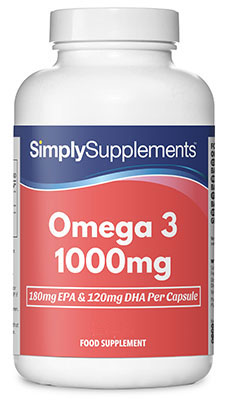Health Benefits of Fish Oils

Fish oils are one of the biggest selling dietary supplements worldwide. They naturally contain high concentrations of omega 3 fatty acids which are known to regulate inflammation throughout the body. As a result, they help to keep all body functions in good working order and defend against age-related decline, particularly heart disease and cognitive function. So if you are looking for a complete supplement for general health then you needn't look any further than a high-quality fish oil supplement.
What Is Fish Oil?
Fish oil is one of the richest natural sources of the essential omega 3 fatty acids eicosapentaenoic acid (EPA) and docosahexaenoic acid (DHA). While there are also beneficial plant sources, the omega 3 content tends to be lower and so fish oils remain the most popular choice.
The human body doesn’t have the ability to produce omega 3’s and so it is absolutely essential to consume sufficient levels through the diet. The easiest ways to achieve this is eating fresh oily fish such as salmon, mackerel or sardines. If you struggle to eat the recommended two portions per week, try adding a good quality fish oil supplement to your routine to top up dietary supplies.
Fish Oil Benefits
Omega 3 is one of the most popular all-round health supplements on the market. The fatty acids EPA and DHA offer anti-inflammatory benefits which are believed to be effective in treating many different ailments. These include:
- Cardiovascular health: Inflammation is a leading cause of circulatory and heart problems. Prolonged inflammation in the blood vessels can cause the walls to become thickened and stiff, which reduces circulation and increases the risk of heart disease. Omega 3’s ability to reduce inflammation in the blood vessels has been shown to reduce the risk of atherosclerosis, heart disease and stroke.
- Triglyceride levels: Triglycerides are a type of fat which accumulates in the blood. Over time, high levels contribute to the thickening and hardening of artery walls (atherosclerosis) and so increase the risk of heart disease. There is evidence to show that fish oils can reduce triglyceride levels, particularly in people with very high levels.
- Cognitive function: Fish oils are often referred to as ‘brain food’ however the exact role they play in the brain is not yet fully understood. It is thought that the anti-inflammatory benefits may help to preserve brain cells, as inflammation can kill healthy cells and speed up cognitive decline. Omega 3 also helps to reduce the levels of an amino acid called homocysteine in the blood, high levels of which can lead to a build-up of fatty plaques in the brain and accelerate cognitive decline. Meta-analysis in 2011 found that consuming high levels of omega 3 significantly reduced homocysteine levels, with treatment periods ranging from 6 to 48 weeks and dosages between 200 to 6000mg per day. Further research is underway to establish the exact dosage required for the beneficial effect.
- Depression: Fish oils are being studied as a possible treatment for depression and manic disorders but, to date, the evidence is not fully conclusive. Several studies show that high strength omega 3 supplements may improve the effectiveness of antidepressants and may even play a protective role in postpartum depression. It is though they work by stabilising the membranes of nerve cells, and as a result, bring the mood back into balance. In 2009 a large clinical trial found that women consuming higher levels of fish oils experienced lowered depressive symptoms. A separate study in 2014 showed that omega 3’s reduced depressive symptoms in patients with high levels of inflammation. However, despite their apparent benefits, fish oils are not a medical treatment and shouldn’t be seen as such. If you suffer from depression speak to your GP to ensure you receive the best course of treatment.
- ADHD: There is some evidence to suggest that children with ADHD are often deficient in omega 3 fatty acids, which may have an effect on learning and behavioural problems. A 2015 trial involved boys aged between 8 to 14 years who had been diagnosed with ADHD. As part of the study, they consumed a margarine enriched with omega 3, or a regular margarine. Findings showed that children consuming the omega 3 enriched margarine had significantly improved attention spans compared to the boys who did not, as rated by their parents. More research is needed for conclusive evidence, however, increasing your omega 3 intake is a reasonable step for anyone with ADHD.
- Eye health: The omega 3 fatty acid DHA is highly concentrated in the retina where it supports healthy retinal function. There is also evidence that increasing your intake of DHA, particularly as you age, may help to relieve dry eye syndrome, glaucoma and age-related macular degeneration.
- Alzheimer’s disease: The emerging evidence for the use of fish oils to reduce the risk of Alzheimer’s disease is inconclusive and requires much more clinical research. However, preliminary findings are promising. Alzheimer’s disease is still little understood, but it is thought that a build-up of fatty plaques in the brain may be a contributing factor. There is some evidence to show that omega 3’s may reduce the build-up of such plaques, but a direct link between fish oils and the prevention of Alzheimer’s is still unfounded.
- Rheumatoid arthritis: Rheumatoid arthritis is an autoimmune disease that causes inflammation in the joints, resulting in pain and stiffness. Many well-designed studies have shown that higher intakes of omega 3 can help to reduce pain associated with RA, and some participants were even able to lower their intake of anti-inflammatory drugs. However, it has not been fully established whether fish oil helps to slow the progression of rheumatoid arthritis or simply treat the symptoms.
- Skin: It is thought that EPA may play a protective role in the skin and so may be beneficial for several different skin-related ailments such as dermatitis and eczema. There is evidence to show that the anti-inflammatory benefits of EPA may help to reduce the dryness and redness caused by such inflammatory skin conditions. One study found that supplementation improved the effectiveness of prescription medications, while another demonstrated their ability to reduce the skin's sensitivity to UV rays.
How Much Should I Take?
When browsing fish oil supplements you will see references to EPA and DHA. These are two of the omega 3 compounds within fish oils that make them so beneficial for health. A total omega 3 content around 250mg per day is ideal for adults looking to maintain general health, however, adults with heart disease or poor cognitive function may benefit from supplements with higher concentrations around 500mg. Basically, the stronger the total EPA and DHA content, the greater the health benefits and protection.
Supplements vs Fresh Fish
The diet should always be the main source of omega oils, while supplements can be used to top up your dietary intake and cover any nutritional gaps. Try to eat two portions of oily fish per week, such as salmon, sardines and mackerel, as recommended by the Department of Health. However, fresh fish contains small levels of toxins and pollutants such as mercury, which can be harmful when consumed in high doses. Therefore you should avoid consuming more than the advised two portions per week.
If you choose to add fish oil supplements to your diet, look for oils which are molecularly distilled. The distillation process completely removes any toxins and impurities, and so the oil is safe to consume in higher quantities. Many high-quality fish oil capsules also contain vitamin E to prevent oxidation of the fats, which over time causes them to spoil and degrade. Be aware of how much vitamin E you are consuming through your diet and other supplements because vitamin E is fat-soluble and can be harmful in very high quantities.
Fish Oil Side Effects and Complications
Fish oils are safe for most adults, including women who are pregnant or breastfeeding. However, taking more than 3000mg per day may reduce blood clotting and increase the chance of bleeding, so high doses should only be taken on the advice of your doctor. Side effects are mild and rare but can include belching, bad breath and heartburn. The oil can also trigger an allergic reaction to fish. If you are looking for a fish-free source of omega 3 fatty acids, consider Flaxseed Oil supplements.
If you are taking fish oils alongside medications to lower blood pressure, have regular check-ups with your doctor to ensure your blood pressure doesn’t drop too low.

 Nicole
Nicole 

























